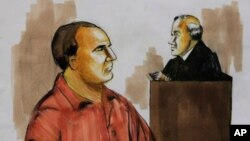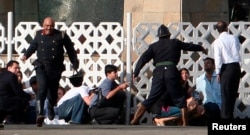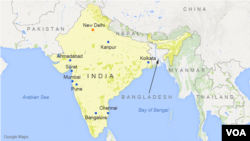An American in a U.S. jail for his role in the 2008 terror attacks that killed 166 people in Mumbai, India, told an Indian court a Pakistan-based Islamic terror group made two failed attempts to mount terror strikes in the city in the months prior to the assault.
David Headley, who is serving a 35-year-sentence for his role in making preparations for the attacks, testified in an Indian court via video link from an undisclosed location in the United States.
Headley’s deposition is expected to give India more ammunition as it continues to press Pakistan to act against those who planned the Mumbai terror strikes, which New Delhi has long blamed on the banned Lashkar-e-Taiba (LeT).
Mumbai attacks
In 2008, 10 heavily armed gunmen mounted coordinated raids that lasted three days on the city’s main rail station, a Jewish center and five-star hotels.
Prosecutor Ujjwal Nikam told reporters Headley said he joined the LeT in 2002 after listening to lectures by Hafiz Saeed, the group’s founder who urged waging “jihad” to free Kashmir from Indian rule.
“They said they should do the jihad. Then I asked the meaning of jihad and he said to fight against the Indian army,” Nikam quoted Headley as saying.
Headley has an American mother and a Pakistani father.
Nikam said Headley, who scouted for locations during seven visits to Mumbai prior to the strike, also revealed he met with officials of Pakistan’s spy agency, the Inter-Services Intelligence.
The 2008 attacks in Mumbai continue to strain relations between the two rivals, with India blaming Pakistan for not doing enough to punish those responsible, and Islamabad saying New Delhi has failed to provide sufficient evidence to win convictions.
Last week, the Indian foreign ministry reacted strongly after Saeed warned of more terror attacks of the kind mounted last month on an Indian air base in Pathankot.
"Saeed is a globally designated terrorist. It is a matter of grave concern that he can enjoy freedom in Pakistan," the statement said.
Tensions
The Pathankot attacks put strains on ties between the two countries just as they appeared to be improving.
Talks between their foreign secretaries have been postponed and no new date has been set for the dialogue.
Kiren Rijiju, India’s junior Home Minister, said Headley's testimony would lead to a logical conclusion in the Mumbai case.
Information provided by Headley, which included information about his background and the "working systems, supports, backups. ... It will help us," Rijiju said.
The United States has turned down India’s request for Headley’s extradition, but a conditional pardon given by an Indian court in December allowed him to become a witness.
His deposition came in connection with the trial of an Indian national, Sayed Zabiuddin Ansari, who is allegedly one of the plotters in the Mumbai terror attacks.







